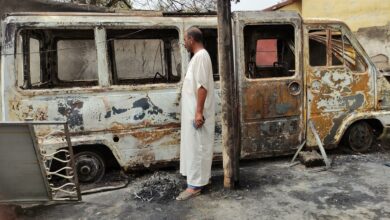Arhuaco tribe asks Bogota to protect their lands from extractive activities

Bogota, Nov 9 (EFE).- About 100 members of the Arhuaco tribe, who live in the Sierra Nevada de Santa Marta mountains along Colombia’s Caribbean coast, on Tuesday asked the national government to protect their territories from extractive activities and not to recognize people who have not been selected by the tribe to govern the region.
The requests were made at a gathering of indigenous people held on the Plaza de Bolivar in downtown Bogota, where they waved flags and said that they will not abandon the site until the Ivan Duque government grants their requests.
Bogota city councilwoman Ati Quigua told EFE that the president acknowledged that a governor of the region who is seeking to give the green light to extractive activities in the Sierra Nevada de Santa Marta had not been selected by the Arhuaco people.
“The ‘mamos’ (spiritual leaders) of the Sierra are asking for respect and for President Duque not to impose a governor that they have not selected or to divide the Arhuaco people with the aim of pushing forward with extractive projects in the Sierra,” said Quigua, who provided no further details about those initiatives.
The Sierra Nevada de Santa Marta is the highest coastal mountain range in the world, covering some 17,000 square kilometers (about 6,500 square miles) in the provinces of Magdalena, La Guajira and Cesar and including such attractions as the Ciudad Perdida (Lost City), a pre-Hispanic city built of stone.
In addition, the tribes in the region have a traditional and cultural link with the Tayrona Park, which for them is a sacred site, according to their cosmology.
Quigua said that for the indigenous people there is no separation between culture and nature and that, in addition, they believe that the best decision for getting out of the climate crisis is to preserve the indigenous lands that today contain 80 percent of the world’s biodiversity.
“The synthesis of the entire historic struggle of all the indigenous peoples is respect for free autonomy and for the free self-determination of the peoples,” said Quigua, who added that “business (cannot prevail) over life,” insisting that “what happens to the land happens to all of us.”
At the COP26 climate summit in Glasgow, Scotland, Duque presented an initiative known as “Road to Zero,” the long-term strategy that will guide management of the climate crisis and whereby the world seeks to reach carbon neutrality by 2050 and reduce by 51 percent the emission of greenhouse gases by 2030.
On the other hand, Tomas Torres, who took part in the gathering in Bogota, told EFE that the tribal members, besides “demanding” that the national government respect the autonomy of indigenous peoples, are hoping to get a hearing with the Constitutional Court for their complaints.
“We have a situation within the Arhuaco people, whereby the national government has allowed itself to be used to create division (within the tribe),” Torres said, referring to the alleged acknowledgement that Duque has made of officials who have not been named by the Arhuacos.
The indigenous peoples’ protest will continue, he said, “until the government provides a positive response to their complaints.
EFE
md-ocm/ime/laa/bp





